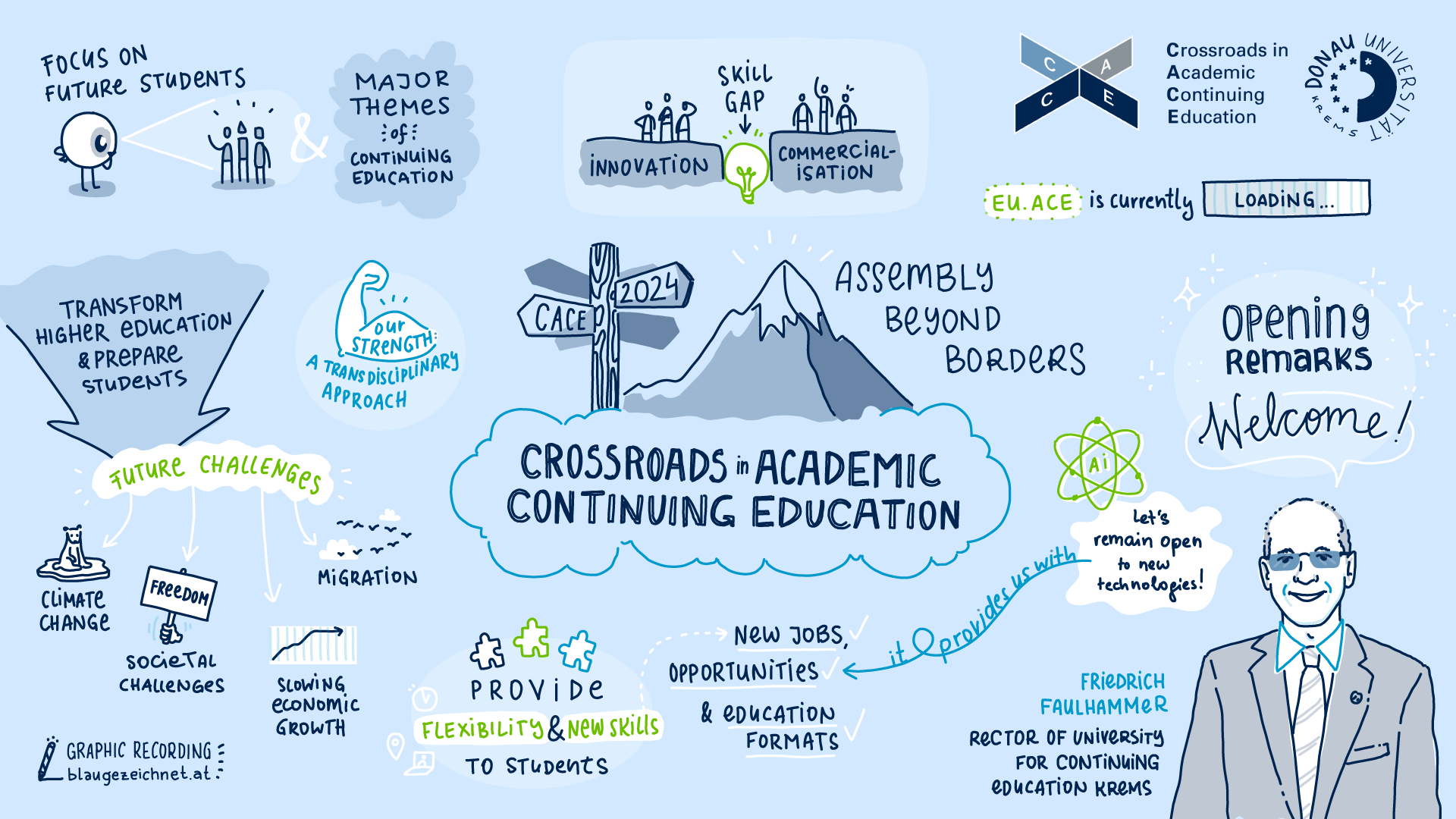Online via Zoom
A think tank for continuing education
What expectations does the next generation have of lifelong learning? This question was the focus of this year's Assembly Beyond Borders of the CACE (“Crossroads in Academic Continuing Education”) think tank. The series of events, which entered its fifth round on 27 November 2024, is organized by the University for Continuing Education Krems (UWK). The event took place virtually again this year and was held under the motto “Next Generation - Continuing Education”. Experts and interested parties from all over the world came together to discuss the future of continuing education.
Friedrich Faulhammer, Rector of the UWK and initiator, opened the event with a welcoming speech. “We are living in a time of multiple global crises,” emphasized Faulhammer, referring to challenges such as low economic growth, migration, climate change and digitalization. These developments would require new and future-oriented skills to keep us and Europe competitive.
Faulhammer quoted Mario Draghi, the former President of the European Central Bank, who diagnosed an “innovation gap” in Europe. This was not due to a lack of ideas or ambition, but to deficits in important skills. Lifelong learning and innovative educational approaches could remedy this. Faulhammer is convinced that artificial intelligence plays a decisive role in closing the innovation gap in Europe, which is why people need to be empowered to use it.
The keynote speeches by experts Peter Parycek, Thorsten Philipp, Thomas Estermann, Christie Schultz and Meghan Grace were at the heart of the event. They addressed the role of critical thinking, transdisciplinarity, governance and leadership, inclusion and diversity as well as incentives for further education. After each presentation, the experts answered questions from the participants.
Break-out sessions were used for professional exchange, as was a panel discussion following the presentations. Moderator Christina Hell, Head of the Department for Teaching Development and Digital Transformation at the UWK, first wanted to know whether the traditional university still had a future in the face of rapid change. Meghan Grace argued that the campus plays an irreplaceable role. This was recently demonstrated during the pandemic. Thorsten Philipp added that friendships are one of the most valuable resources for learning - and they are not equally possible online. According to Christie Schultz, face-to-face learning will continue to exist, but will be even more closely interlinked with online learning in the future.
Peter Parycek suggested rethinking the campus concept. Universities need to become places of collaboration, social interaction and innovation, including architecturally. “We need to think more about what we teach on campus and what we teach online.” Universities as such have a future, says Thomas Estermann. However, only those institutions that are able to manage change well.
The discussion clearly showed that universities need to demonstrate openness towards technological developments. Schultz believes it is important to overcome fears of new technologies such as artificial intelligence and to experiment with them. Parycek emphasized the importance of governance and leadership to keep pace in times of disruptive change. “There is a lot to do to ensure we remain relevant as universities.”
Despite the challenges, optimism prevailed among the experts. “I see a great openness to learning from others,” says Estermann. He is convinced that institutions that work together with partners and seek external expertise are also fit for the future. What makes Philipp confident: “We have learned to empower students to take responsibility for their own learning path.” As an example, he cited so-called “project workshops” in Berlin, in which students work on problems independently and without teachers.
Managers in continuing education need to demonstrate creativity and adaptability, be able to implement changes competently and focus on people. They need to think about a good combination of face-to-face and online learning. It is also crucial to be open to innovative approaches and new technologies. And, last but not least, to develop themselves further and join forces with others in order to face challenges together.
Read more about CACE 2024
Contact
Tags

